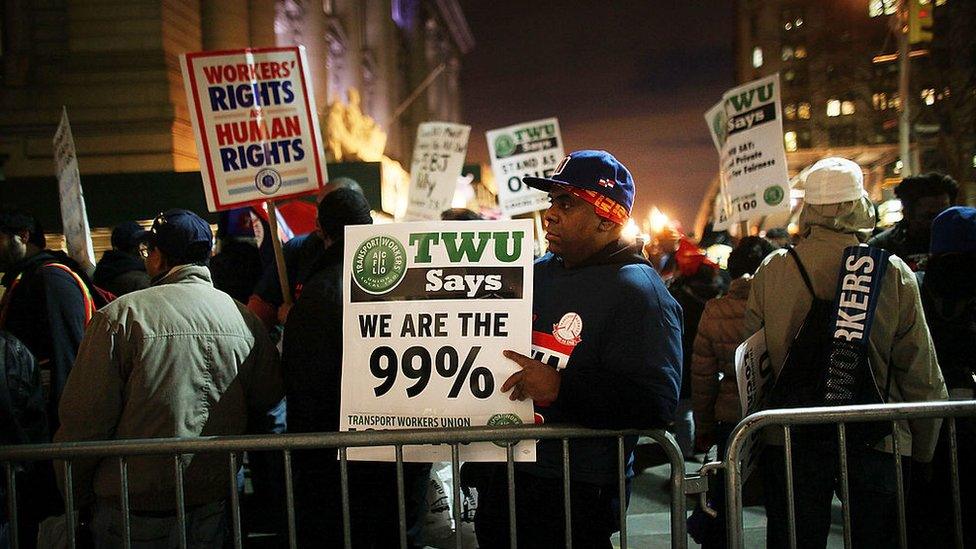Does it ever make sense to ask for a pay cut?
- Published

Richard Pennycook's move should be a 'wake-up call' to other CEOs, say some
The boss of the Co-op Group has asked for a £500,000 pay cut. Starting in July, chief executive, external Richard Pennycook's basic salary will fall from £1.25m to £750,000.
At first glance, this may seem a little crazy - if your company's board of directors is prepared to pay you that much, why take less?
But sometimes there can be legitimate business reasons to volunteer for a smaller pay packet, even if you are not a senior executive.
Mr Pennycook said that long days and weekends working away from his family at the office last year had justified his £3.6m total take-home pay in 2015.
"We've been through a difficult period which was very intense and I hope members would regard my remuneration as having been appropriate for that time," he told the BBC.
But now, according to Co-op chairman Allen Leighton, the company's continued recovery represents an opportunity for his chief executive to take a pay cut.
'Refreshing lesson'
Mr Pennycook has subsequently suggested he should not be held up as an example for other top executives.
But Simon Walker, head of the Institute of Directors (IoD), called the decision "refreshing" and said the move should serve as a lesson for other company chiefs.
"The proactive steps taken today by Mr Pennycook and the Co-op's board should be a wake-up call to other companies," he said.

Bank bosses fought a rearguard action against losing their bonuses after the 2008 financial crisis
"Being open, honest and transparent about the salaries of senior executives can go a long way to restoring public trust in British businesses."
Top executives faced withering scrutiny about their pay during the 2008 financial crisis, prompting a growing public examination of the relationship between chief executives' compensation and company performances.
The Co-op's boss seems to be bucking the trend in this respect.
Corporate bosses, particularly in the banking sector, have fought a rearguard action against losing their bonuses after the financial crisis caused a backlash against corporate largesse.
Prof Chris Roebuck of London's Cass Business School lectures on leadership and says Mr Pennycook has set an example "others should follow".
"Creating a 'we not me' culture actually makes more money than a 'me not we' one."
Executive pay worldwide
The Co-operative is - by the terms of its charter - not a publicly listed company, but across corporate Britain pay disparities have continued to rise.
FTSE 100 bosses earned 183 times the salaries of the average UK worker in 2014, according to numbers released by the High Pay Centre, external.
Their average pay packets rose from £4.1m in 2010 to £4.9m in 2014.

The increasing pay gap between workers and CEOs has led to numerous protests around the globe
The debate over excessive executive pay has long raged across the Atlantic as well, where the top nine US chief executives earn 800 times more than their average workers.
Last year Daniel Price, boss of Seattle-based payments firm Gravity, famously slashed his annual income from a peak of $2m in 2012 to just $70,000 - an amount he introduced as the company's minimum salary.
Mr Price won global plaudits for the move, and the company was immediately overwhelmed by job applicants.
But he has subsequently faced a lawsuit from his co-founder and brother, for paying himself excessively in the years leading up to the headline-grabbing pay cut announcement.
For two successive years the head of the world's largest PC manufacturer, Lenovo, shared his personal bonus with employees in 2012 and 2013.
The firm's head of HR at the time said that CEO Yang Yuanqing wanted "to ensure all of our employees understand the impact" they had on building the company.
Lenovo's headquarters are in Beijing, capital of communist China, where wealth disparity is considered by many to present a significant challenge to the country's political system.

Lenovo's boss Yang Yuanqing shared his bonus with all his workers for two years
Pay cuts for workers
But it hasn't just been the odd company boss who has taken a pay cut. German factory workers took pay cuts across the board after the financial crisis.
And a 2011 study by analysts at Booz & Co (now part of PricewaterhouseCoopers) argued that reducing the pay of long-standing employees was a preferable alternative to firing them when cost reductions are required.
While firms have frequently forced pay cuts upon workers if their company is performing poorly, recent corporate history contains few examples of corporate chiefs who have volunteered to sacrifice their salary.
And deciding to do so during a period of "recovery" is what makes Mr Pennycook at the Co-op so very unusual.
Mind you, it does help a lot in taking a pay cut if you are already on a salary of £1.25m.
- Published7 April 2016

- Published5 January 2016

- Published9 February 2016
